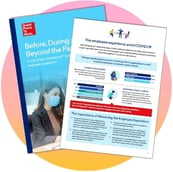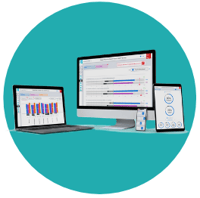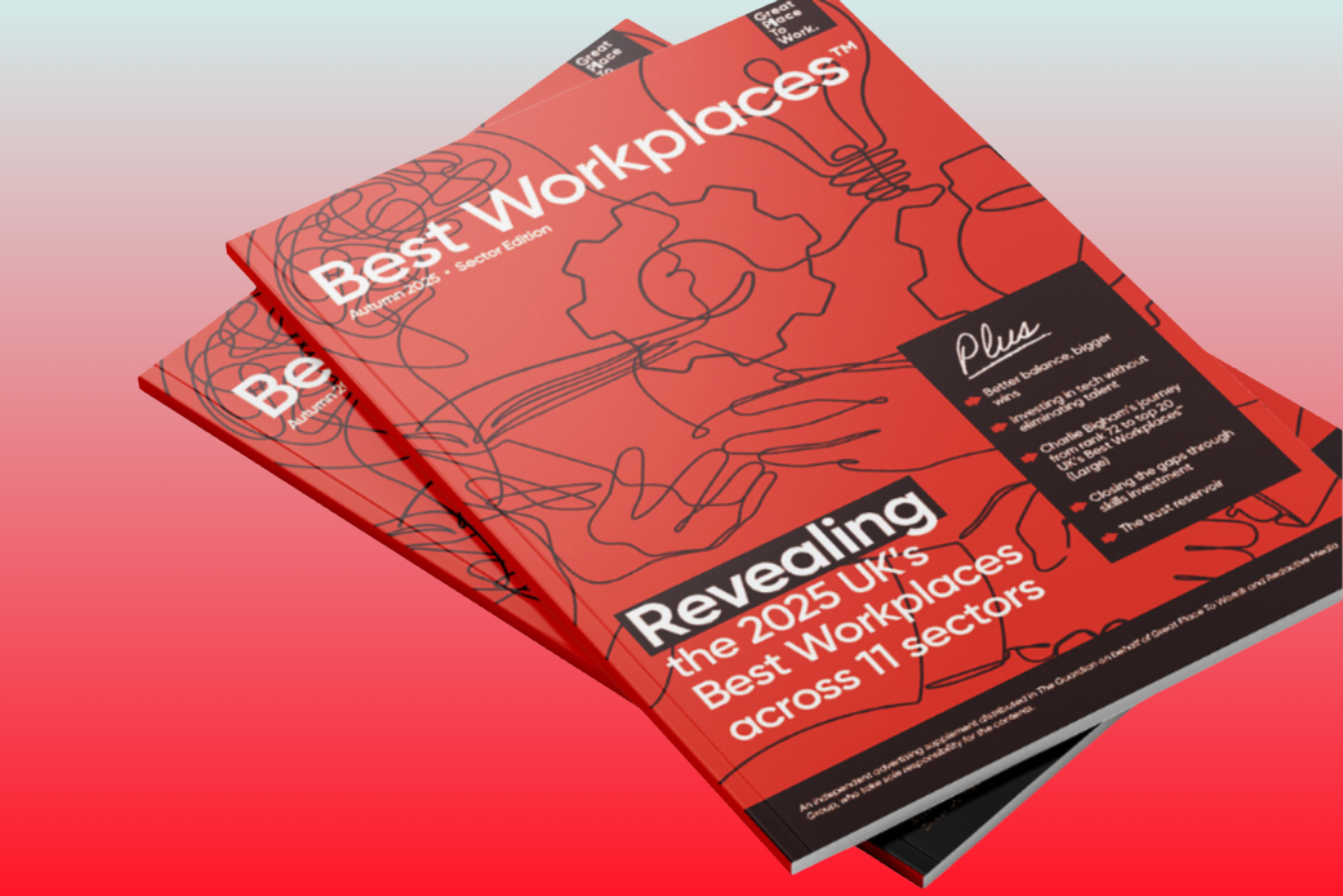Many businesses fortunate enough to still be hiring during these times are faced with a new challenge: 100% remote onboarding. As humans, we need interaction to learn and grow in our interdependent world. Interactions add colour, richness and a sense of connectedness to the culture of all companies.
Here are a few ways you can infuse your culture successfully into your remote onboarding programme:
1) Get the rest of the organisation excited about new hires
Your new hire was brought on board for a reason, and they’ve already done the work to get there. They have the qualities and skills needed to add more value to the team and bring you closer to achieving your organisation’s mission.
Prepare existing employees and managers to give new hires a warm welcome by:
-
Encouraging your leaders to anticipate greatness from fresh talent;
-
Ensuring managers articulate how the company’s success and shared purpose is accelerated by new starters;
-
Making an announcement that celebrates new employees’ unique gifts and who they are as human beings to help your employees get to know them;
-
Inviting new hires to write a few words about themselves so that team members can identify any shared interests or interests that excite curiosity (connections happen quickly when there is more than just work to share).
2) Assign a ‘new hire buddy’ that embodies your company culture
Your new hires need a friendly face to go to for clarity and guidance about the business. A buddy system should include regularly scheduled check-ins to create a dedicated safe space for new employees to seek answers or information they don’t feel comfortable asking in a group.
Be intentional about the buddy system. An ideal ‘new hire buddy’ is someone who:
- Embodies the organisation's core values
- Acts as an ambassador of the business
- Thrives as a go-to guide for others
It’s important to be sure that the buddy genuinely wants to be and enjoys being a part of the journey others embark on (bonus points if coaching is already a part of your buddy’s own career development).
Enhance Your Remote Onboarding Programme with Real-Time Feedback from New Starters!
Novel challenges require novel solutions. Run a quick pulse survey specific to new hires after the onboarding period using our unique Emprising™ platform.
3) Encourage virtual coffee catch-ups with varying roles in the business
It’s important to set time aside each day for new starters to establish relationships with existing employees as soon as possible. This is especially true if your onboarding process is very information-heavy.
This deliberate approach to virtual office connections in a remote environment will accelerate team camaraderie. Most of these casual meetings should be with employees outside of the new hire’s own role, so that they can learn about different aspects of the business and connect with the people that can provide context for the big picture.
Since every organisation is unique, these informal meetings will enable new employees to connect the dots of your business more efficiently. It will also help them to better associate the information they receive from this training with the various roles that perform these important duties within the business overall.
In an office setting, these connections may have happened organically. In a remote setting, these dedicated meetings create a more intentional way of connecting to your workplaces’ social ecosystem than ever before.
4) Create an ERG made up of first-year employees & let them meet periodically
It’s already difficult to be the new employee in an office setting. In the remote world, even more so. Having an Employee Resource Group (ERG) for all of your relatively new hires to share learnings will foster a sense of camaraderie early because everyone in the group can relate to one another.
ERGs are voluntary, employee-led groups whose aim is to foster a diverse and inclusive workplace aligned with the organisations they serve. They typically include employees who share a characteristic, whether it's gender, ethnicity, religious affiliation, lifestyle or a particular shared interest. The groups exist to provide support and help in personal or career development, as well as to create a safe space where employees can bring their whole selves to the table. Allies may also be invited to join the ERG to support their colleagues.
You can provide prompts for group meetings to have more intention or allow for free form discovery and natural conversation. There’s no wrong way to let a group like this connect – it’s more about common ground than having a set agenda.
5) Be vulnerable and share the opportunities of the business
No business has perfect processes in place and there’s always room to improve or grow as the world around us constantly evolves. Leaders and individual contributors alike should always voice what’s not working, especially if your company is new to operating remotely.
Your new starters, having begun in a completely remote environment, will have first-hand knowledge and ideas for improving the remote experience. In fact, that was the inspiration for this post!
6) Always meet your new starters where they are at, not the other way around
Remote employees do not have the luxury of being shoulder to shoulder with a veteran employee to ask quick questions or get in-the-moment guidance. That kind of support has always shortened the learning curve. Today, questions asked on a messaging platform like Teams or Slack are answered when someone is available to answer them.
Increased frequency in meetings, varied time zones and overall bandwidth can all effect how quickly questions are answered these days. It’s important to give new employees as much time as they need to learn about the core business and its products or services, and the safety to ask as many questions as they need.
Have a 30-, 60- and 90-day development checklist for new hires to assess their needs and confidence in different areas. But avoid the expectation to know everything by a certain date. Embrace the way they learn and the journey to help them get there. Understanding how employees receive information best is where step number 7 (below) comes into play.
7) Double up the one-on-ones with people managers
Every manager should have 1:1 catch-ups with direct employees in their schedule. But new hires in a remote environment may benefit from twice as many for at least the first 90 days into the onboarding process.
This extra ‘face time’ is essential for establishing a remote mentor-mentee relationship. It takes time to develop and understand each other’s communication styles, so managers will need to spend extra time with new hires to cultivate a bond early on that facilitates great communication.
Be cautious not to over-communicate too! After the 2-3 weeks, allow new starters to take the lead with how often they feel they’d like their 1:1 with you. That way, you avoid overwhelming them and they feel a sense of autonomy in how they balance their time working on projects vs. time learning about the organisation.
8) Celebrate milestones with a proper shout out on your communication tool
We’ve all heard the idea of celebrating small wins. Now is an ideal time to put that into practice!
For example, managers can recap what the 90-day onboarding journey of a new hire has brought to the team.
Share what the team has learned from new starters and how they’ve already added value in their first few months at the company. Collect anecdotes from those who have spent time with the new hire to share words of encouragement and make your pride in this employee known.
First impressions last much longer than the initial moment, so during this period of isolation in so many other areas of life, focus this time on connecting.
Your new remote employees will then have an unforgettable onboarding experience in a space they look forward to logging into every day.

Employee Experience: Impact of Covid-19 Report
Download your copy and see how Best Workplaces™ are tailoring their employee experience to fit a post-Covid world.
This feature has been adapted from the original article by Shaun Aguilera, a Customer Success Manager at Great Place to Work®.
Recommended for you:
Great Place to Work® UK specialises in helping organisations build impactful workplace cultures. We are here to help support our clients during this period of uncertainty. If you are a client, please reach out to your Account Manager who can share the tools we have in place to enable workplaces to measure and understand their current employee sentiments. If you are not a current client, stay tuned to our blog posts, Twitter, LinkedIn and publications for people practices, advice and thought leadership on how best to navigate this unprecedented time.








.png)




